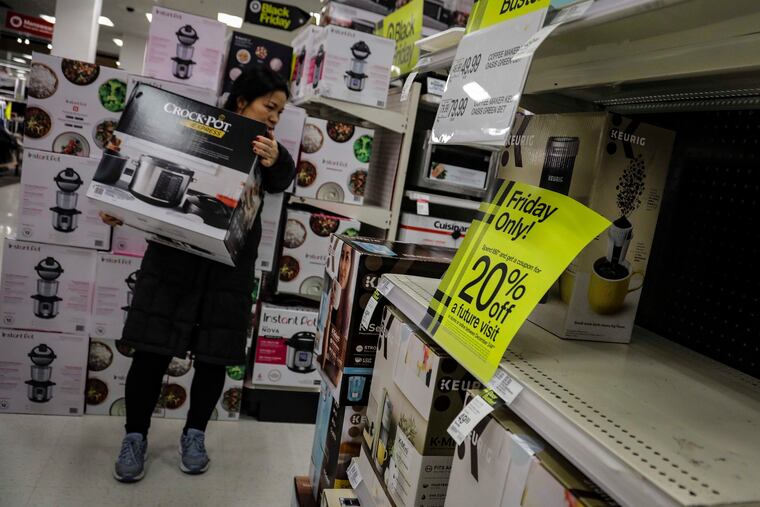A record 190 million Americans shopped Thanksgiving weekend, most of them online
A record 189.6 million Americans went shopping over the five-day Thanksgiving weekend, the National Retail Federation said Tuesday, and most of them did their spending online.

A record 189.6 million Americans went shopping over the five-day Thanksgiving weekend, the National Retail Federation said Tuesday, and most of them did their spending online.
The new bar represents a 14% increase from last year, the industry lobbying group said. About 142 million consumers shopped online, 124 million flocked to stores, and roughly 76 million did both.
"Americans continue to start their holiday shopping earlier in the year, and Thanksgiving is still a critical weekend for millions," Matthew Shay, president of NRF, said in a statement.
After weeks of hinting that a trade deal with China was on the horizon, President Donald Trump reversed course Tuesday, saying that he was willing to wait until after the 2020 presidential election to strike an agreement. Major markets tumbled more than 1% following the news. On Tuesday afternoon, hours after its optimistic update on holiday spending, the NRF cautioned that trade uncertainties are "a bad deal" for "every segment of the economy."
"We want and need to see a deal as soon as possible," said David French, the group's senior vice president for government relations, in a news release. "The tariffs continue to hurt U.S. businesses, workers and consumers and are a substantial drag on the U.S. economy."
Consumer spending, which makes up more than two-thirds of the U.S. economy, has remained a bright spot. But some economists say they're watching to see whether the momentum will continue into the new year.
The shorter holiday shopping season, combined with Trump's trade wars and other economic and political uncertainties, have fueled fears that consumers could pull back at any point. There also are signs that consumers are taking on more debt to pay for their purchases, which economists say could spell trouble for the economy. Personal loans have risen more than 10% since last year, according to recent data from Equifax.
Consumers spent an average of $361.90 from Thanksgiving through Cyber Monday, a 16% increase from last year, when holiday spending fell short of expectations. The NRF did not release full sales figures for the period, which is the traditional start of the holiday shopping season, but reiterated that it expects overall holiday spending to grow about 4% to $730 billion.
This year, the nation's largest retailers began offering holiday discounts in October in hopes of getting consumers to open their wallets earlier. The strategy appears to have worked, at least for now: More than half of consumers - 52% of them - said they've finished their holiday shopping, compared with last year's 44%.
Meanwhile, the largest online shopping day got even bigger. Americans spent a record $9.4 billion on Cyber Monday, which is about 20% higher than the $7.9 billion recorded last year, according to Adobe Analytics. About one-third of those purchases were made on smartphones.
Amazon, the world’s largest online retailer, said Tuesday that Cyber Monday was the single biggest shopping day in company history, though it did not offer specifics. (Amazon founder Jeff Bezos owns the Washington Post.)
The average customer spent an additional 6% this Cyber Monday than last year, according to Adobe Analytics, which measures transactions from 80 of the nation’s 100 largest online retailers. The day’s top sellers included “Frozen 2” toys, Nintendo Switch gaming console, Samsung TVs, and Apple laptops.